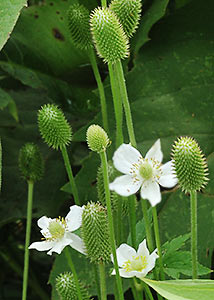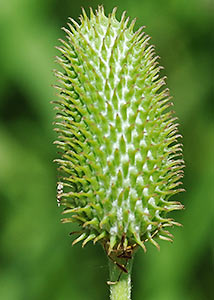
Date: XXXXXXX, 2011. Location: (map)
| Classification Hierarchy | |
| Kingdom | Plantae |
| Subkingdom | Tracheophyta |
| Superdivision | Spermatophyta |
| Division | Magnoliophyta |
| Class | Magnoliopsida |
| Subclass | Magnoliidae |
| Order | Ranunculales |
| Family | Ranunculaceae |
| Genus | Anemone |
| Species | Anemone cylindrica |

Date: XXXXXXX, 2011. Location: (map)
USDA Plant Profile Flora of N. America
Scientific Name: Anemone cylindrica (anemone=wind, cylindrica=cylindrical)
Common Name: Thimbleweed
Origin: Native
Notes: The distinctions between A. cylindrica and A. virginina can be difficult. Here are some clues: A. cylindrica has longer seed heads which appear cylindrical, the heads (2-8) per plant are supported on stems (pedicels) at the base of which is a whorl of 3-7 ternate leaf-like involucral bracts in 2 closely nestled tiers. There are no involucral bracts on the middle of the pedicels. The involucral bracts and the origin of the cymose inflorescence are at the summit of the peduncle (lower part of the flower stem). A. virginiana has shorter seed heads which appear more oval than cylindrical and at least some of the pedicels have 2-3 secondary involucral leaf-like bracts near the center of the stem.
Additional references: 1, 2, 3, 4, 5, 6, 7, 8, 9, 10, 11, 12.
Flowers: June; 5 sepals, greenish white; pedicels (10-30 cm) usually without bracts; Inflorescence 2-8 flowered cymes, pedicels and peduncle villous; Involucral bracts 3-7 ternate, bases distinct, appear similar to basal leaves; Fruit, woolly achenes beaked usually recurved.
Leaves: Basal leaves 5-10 ternate, petiole 9-21 cm. margins crenate or serrate and deeply incised.
Habitat: Dry, open woods, prairies, roadsides.
Glossaries of botanical terms: 1, 2, 3, 4, 5, 6, 7, 8, 9, 10.



